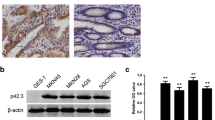Abstract
Objective: S-phase kinase-associated protein 2 (Skp2) is a positive regulator of G1-S transition and promotes ubiquitin-mediated proteolysis of the cyclin-dependent kinase inhibitor p27. Its overexpression has been implicated in cell transformation and oncogenesis. In this study, we investigated significance of Skp2 expression in human gastric carcinoma and the relationship between Skp2, p27 and PTEN expression. Methods: Immunohistochemical analysis was performed on 138 surgical resected primary gastric carcinoma specimens, 102 paired metastasis carcinoma tissue specimens in lymph node from the same set of 138 surgical resected primary gastric carcinoma specimens, 30 dysplasia specimens, 30 intestinal metaplasia specimens, and 20 normal gastric mucosa specimens for Skp2 and performed on the same set of 138 surgical resected primary gastric carcinoma specimens for p27 and PTEN. Results: Skp2 labeling frequency % was increased dramatically in intestinal metaplasia, dysplasia, and primary gastric carcinoma compared with normal gastric mucosa (P=0.000, all the same). Skp2 labeling frequency % in metastasis gastric carcinoma in lymph node was significantly higher than primary gastric carcinoma (P=0.037). Skp2 labeling frequency % was positively associated with differentiated degree (rho=0.315, P=0.000), vessel invasion (rho=0.303, P=0.000) and lymph node metastasis (rho=0.254, P=0.000) respectively. An inverse correlation of Skp2 was observed with both its biochemical target p27 expression in gastric carcinoma (rho=−0.451, P=0.000) and with its putative negative regulator, the PTEN tumor suppressor protein (rho=−0.480, P=0.000). p27 expression had positive relationship with PTEN expression in gastric carcinoma (rho=0.642, P=0.000). Conclusion: Skp2 overexpression is correlated with carcinogenesis and progression of gastric carcinoma: elevated Skp2 expression is correlated with decreased p27 and PTEN in gastric carcinoma, and p27 expression is parallel with PTEN expression. These suggest that PTEN may regulate expression of p27 through the Skp2 pathway, and the effects of Skp2, p27 and PTEN together play an important role in carcinogenesis and progression of gastric carcinoma.
Similar content being viewed by others
References
Philipp Staheli J, Payne SR, Kemp CJ. p27 (Kip1): regulation and function of a haploinsufficient tumor suppressor and its misregulation in cancer [J]. Exp Cell Res 2001; 264:148–68.
Pagano M, Tam SW, Theodoras AM, et al. Role of the ubiquitin-proteasome pathway in regulating abundance of the cyclin-dependent kinase inhibitor p27 [J]. Science 1995; 269:682–5.
Slingerland J, Pagano M. Regulation of the cdk inhibitor p27 and its deregulation in cancer [J]. J Cell Physiol 2000; 183:10–7.
Eguchi H, Herschenhous N, Kuzushita N, et al. Helicobacter pylori increases proteasome-mediated degradation of p27 (kip1) in gastric epithelial cells [J]. Cancer Res 2003; 63:4739–46.
Fero ML, Randel E, Gurley KE, et al. The murine gene p27 kip1 is haplo-insufficient for tumor suppression [J]. Nature 1998; 396:177–80.
Carrano AC, Eytan E, Hershko A, et al. Skp2 is required for ubiquitin-mediated degradation of the CDK inhibitor p27 [J]. Nat Cell Biol 1999; 1:193–9.
Sutterluty H, Chatelain E, Marti A, et al. p45SKP2 promotes p27Kip1 degradation and induces S phase in quiescent cells [J]. Nat Cell Biol 1999; 1:207–214.
Tsvetkov LM, Yeh KH, Lee SJ, et al. p27 (Kip1) ubiquitination and degradation is regulated by the SCF (Skp2) complex through phosphorylated Thr187 in p27 [J]. Curr Biol 1999; 9:661–4.
Nakayama K, Nagahama H, Minamishima YA, et al. Targeted disruption of Skp2 results in accumulation of cyclin E and p27 (Kip1), polyploidy and centrosome overduplication [J]. EMBO J 2000; 19:2069–81.
Mamillapalli R, Gavrilova N, Mihaylova VT, et al. PTEN regulates the ubiquitin-dependent degradation of the CDK inhibitor p27 (KIP1) through the ubiquitin E3 ligase SCF (SKP2) [J]. Curr Biol 2001; 11:263–7.
Yang G, Ayala G, De Marzo A, et al. Elevated Skp2 protein expression in human prostate cancer: association with loss of the cyclin-dependent kinase inhibitor p27 and PTEN and with reduced recurrence-free survival [J]. Clin Cancer Res 2002; 8:3419–26.
Latres E, Chiarle R, Schulman BA, et al. Role of the F-box protein Skp2 in lymphomagenesis [J]. Proc Natl Acad Sci USA 2001; 98:2515–20.
Gstaiger M, Jordan R, Lim M, et al. Skp2 is oncogenic and overexpressed in human cancers [J]. Proc Natl Acad Sci USA 2001; 98:5043–8.
Kudo Y, Kitajimja S, Sato S, et al. High expression of S-phase kinase-interacting protein 2, human F-box protein, correlates with poor prognosis in oral squamous cell carcinomas [J]. Cancer Res 2001; 61:7044–7.
Hershko D, Bornstein G, Ben Izhak O, et al. Inverse relation between levels of p27 (Kip1) and of its ubiquitin ligase subunit Skp2 in colorectal carcinomas [J]. Cancer 2001; 91:1745–51.
Signoretti S, Di Marcotullio L, Richardson A, et al. Oncogenic role of the ubiquitin ligase subunit Skp2 in human breast cancer [J]. J Clin Invest 2002; 110:633–41.
Kiepp DM, Harper JW, Elledge SJ. How the cyclin became a cyclin: regulated proteolysis in the cell cycle [J]. Cell 1999; 97:431–4.
Carrano AC, Pagano M. Role of the F-box protein Skp2 in adhesion-dependent cell cycle progression [J]. J Cell Biol 2001; 153:1381–90.
Konturek PC, Kania J, Konturek JW, et al. Hpylori infection, atrophic gastritis, cytokines, gastrin, COX-2, PPAR gamma and impaired apoptosis in gastric carcinogenesis [J]. Med Sci Monit 2003; 9:SR53–66.
Gottschalk AR, Basila D, Wong M, et al. p27Kip1 is required for PTEN-induced G1 growth arrest [J]. Cancer Res 2001; 61:2105–11.
Zheng HC, Chen Y, Kuang LG, et al. Expression of PTEN-encoding product in different stages of carcinogenesis and progression of gastric carcinoma [J]. Chin J Oncol 2003; 25:13–6.
Kim DH, Lee HI, Nam ES, et al. Reduced expression of the cell-cycle inhibitor p27 Kip1 is associated with progression and lymph node metastasis of gastric carcinoma [J]. Histopathology 2000; 36:245–51.
Author information
Authors and Affiliations
Corresponding author
Additional information
Biography: MA Xiu-mei (1970–), female, doctor of medicine, associate professor, now working at Inner Mongolia Medical College, majors in tumor pathology.
Rights and permissions
About this article
Cite this article
Ma, Xm., Zuo, Lf. Significance of Skp2 expression in human gastric carcinoma and the relationship between Skp2, p27 and PTEN expression. Chin. J. Cancer Res. 17, 177–184 (2005). https://doi.org/10.1007/s11670-005-0036-z
Received:
Accepted:
Issue Date:
DOI: https://doi.org/10.1007/s11670-005-0036-z




